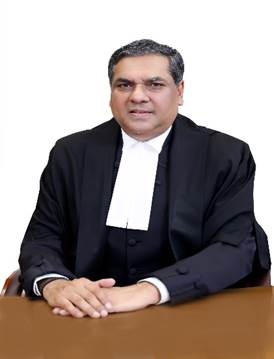By Our Correspondent
BHUBANESWAR: In exercise of the power conferred by clause (2) of Article 124 of the Constitution of India, the President is pleased to appoint Shri Justice Sanjiv Khanna, Judge of the Supreme Court, as the Chief Justice of India, with effect from 11th November, 2024. Justice Khanna is due to retire on 13th May, 2025, as the 51st Chief Justice of the Supreme Court of India.
Hon’ble President of India has signed the Warrant for appointment of Shri Justice Sanjiv Khanna as the next Chief Justice of India and the notification of his appointment has accordingly been issued by the Department of Justice, Government of India. Shri Justice Sanjiv Khanna will take over as the Chief Justice of India on 11th November 2024.
Hon’ble Mr. Justice Sanjiv Khanna was elevated as a Judge of the Supreme Court of India on 18th January, 2019. In this capacity, he has authored several landmark rulings, and served on multiple Constitution Benches at the Supreme Court. His judgments consistently underscore the primacy of personal liberty, robust democratic participation and individual autonomy. Known for his meticulous preparation, Justice Khanna’s judicial approach has been characterized by a pragmatic view of dispute resolution and efficacious use of judicial time.
In addition to his judicial responsibilities, he is the Executive Chairman of the National Legal Services Authority and serves on the Governing Council of the National Judicial Academy, Bhopal. Under his stewardship, the National Legal Services Authority has fostered an approach that prioritises direct community engagement, strengthening access to justice at the grassroots.
Justice Khanna’s judicial career began with his appointment as an Additional Judge of the Delhi High Court in 2005, where he was later made a Permanent Judge. As a High Court Judge, Justice Khanna was at the helm of several key institutions, such as the Delhi Judicial Academy, Delhi International Arbitration Centre, and the District Court Mediation Centres.
Across four decades of exemplary legal service, Justice Khanna’s trajectory spans both private practice and judicial office. From simple beginnings in the District Courts at the Tis Hazari complex in Delhi, to subsequently expanding his practice to the Delhi High Court and numerous tribunals, Justice Khanna built his expertise in constitutional law, taxation, arbitration, and commercial litigation. His practice in the Delhi High Court was marked by a significant seven-year tenure as Senior Standing Counsel for the Income Tax Department, and as Standing Counsel (Civil) for the National Capital Territory of Delhi in 2005. Justice Khanna’s diverse legal portfolio includes contributions as an Additional Public Prosecutor and amicus curiae in criminal matters.



























